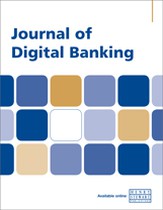The inverted bank: How platforming helps exploit ecosystems
Abstract
Ecosystems are emerging as major drivers of economic activity all across the world. The emergence of ecosystems is seeing a fundamental transformation of traditional business models across all sectors of the economy. The FinTech movement has been one of the earliest ecosystem-based disruptions that have profoundly affected the banking sector. The banking sector globally has been trying to build strategies to engage and exploit ecosystems with varying degrees of success. Community banks have been early adopters of ecosystems, leveraging the traditional banking infrastructure to take deposits, underwrite loans and provide the regulatory governance infrastructure to FinTechs, whereas FinTechs provide the necessary customer experience layer and create innovative new products and services. While large banks are pursuing major digital transformation programmes to make banking services more accessible to customers and partners, smaller community banks are devising new ways of remaining low-cost players with personalised services. Digital ecosystems are now opening scope for API-fication and AI-based decision-making. Smaller niche firms are now able to build and integrate faster and demonstrate business agility. In this paper we present a summary of the macro environment that is driving changes to business structure in enterprises. The present FinTech engagement strategies of banks are presented through the lens of motivation to go-to market with new products and features that appeal to the end-customer. We have also attempted to analyse the relative merits and demerits of each strategy. If banks must emerge as ecosystem orchestrators, they will need to re-architect themselves into digital platforms. This is even more relevant for community banks. We present a logical architecture of such banking platforms and important features that need to be built into these platforms. Finally, we have presented a model of an ‘inverted bank of the future’, where many existing production activities of the bank, large and small alike, will be performed outside the bank’s boundaries by the banks’ ecosystem.
The full article is available to subscribers to the journal.
Author's Biography
Sankha Som is the Chief Innovation Evangelist for Corporate Research and Innovation at Tata Consultancy Services (TCS). He is responsible for articulating TCS Research and Innovation’s value proposition to its global customer base and also for ensuring a steady flow of insights and foresight from TCS’s ecosystem into its research and innovation planning process. He has more than 18 years of experience across R&D, presales, sales and innovation management. He holds a bachelor’s degree in Computer Science and an MBA from the Indian School of Business in Hyderabad, India.
V. Ram Ram is the CTO for the Banking, Financial Services and Insurance (BFSI) business at TCS. He is responsible for helping clients innovate across a multihorizon time frame. As head of the BFSI Labs, he works closely with TCS Research and the start-up ecosystem, incubating innovative ideas. A Computer Sciences engineer by training, Ram has worked in transformation, sales and innovation management roles in TCS. During his tenure of over 28 years with TCS, he has led several large mission-critical transformation programmes. Two of his programmes have won the prestigious ‘Banker Technology Awards’ from The Banker, a magazine belonging to the UK-based Financial Technology group.
